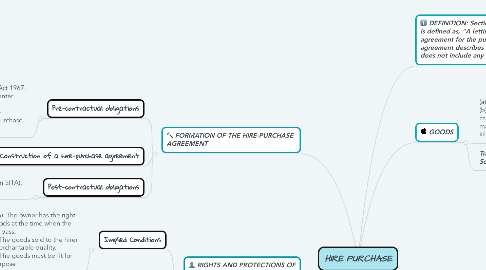
1. DEFINITION: Section 2(1) of the Hire-Purchase Act 1967, hire-purchase is defined as, "A letting of goods with an option to purchase and an agreement for the purchase of goods by installments (whether the agreement describes the installments as rent or hire or otherwise), but does not include any agreement :-
1.1. (a) whereby the property in the goods comprised therein passes at the time of the agreement or upon or at any time before delivery of the goods; or
1.2. (b) under which the person by whom the goods are being hired or purchased is a person who is engaged in the trade or business of selling goods of the same nature or description as the goods comprised in the agreement."
2. GOODS
2.1. (a) All consumer goods; and (b) Motor vehicles including invalid carriages, motor cycles, motor cars (for example taxi cabs and hire cars), goods vehicles (the maximum permissible laden weight does not exceed 2540 kilograms) and buses (including stage buses).
2.2. Tractors Malaysia Bhd v Kumpulan Pembinaan Malaysia Sdn.Bhd. [1979] 1 MLJ 129
3. FORMATION OF THE HIRE-PURCHASE AGREEMENT
3.1. Pre-contractual obligations
3.1.1. Section 4(1) of the Hire-Purchase Act 1967. Section 4(3): he is not obliged to enter into a transaction. Section 4(4): failure to observe the obligations shall render the hire-purchase agreement void.
3.2. Construction of a hire-purchase agreement
3.2.1. Section 4A(1), Section 4B(1), Section 4C(1)(c), Section 4C(1)(b), Section 4D(1), Section 4D(2)
3.3. Post-contractual obligations
3.3.1. Section 5(1), Section 5(1A), Section 5(3)
4. RIGHTS AND PROTECTIONS OF HIRERS
4.1. Implied Conditions
4.1.1. Section 7(1)(b): The owner has the right to sell the goods at the time when the property is to pass. Section 7(2): The goods sold to the hirer must be of merchantable quality. Section 7(3): The goods must be fit for the hirer's purpose
4.2. Implied Warranties
4.2.1. Section 7(1)(a): The hirer must enjoy quiet possession of the goods. Section 7(1)(c): The goods are free from any charge or encumbrance created by the owner in favour of any third party
5. STATUTORY RIGHTS OF THE HIRER
5.1. Section 9: Right to a copy of statement of financial position. Section 10: Right to appropriation of payment when more than one agreement. Section 11: Right to apply for an order to remove goods. Section 12: Right to assign hirer's rights under the agreement. Section 13: Passing of right by operation of law. Section 14: Right to early completion of agreement. Section 15: Right to terminate the agreement.
6. REPOSSESSION OF GOODS BY THE OWNER
6.1. (a) Section 16(1): The owner must serve a Fourth Schedule notice to the hirer. •Section 16(2): The service of the Fourth Schedule notice is not necessary if the owner has reasonable ground to believe that the hirer will conceal or remove the goods to another place unknown to the owner. •Section 16(1A): The owner can repossess the goods after there have been four consecutive defaults of payment (deaths). (b) Notice under Rule 3 of the Hire-Purchase (Recovery of Possession and Maintenance of Records by Owners) Regulation 1976. (c) Compliance or non-compliance of the hirer to the notice (Section 16A).
6.2. Procedures during Repossession
6.2.1. a) Personal service of a document acknowledging receipt of the goods (Section 16(4)). b) Rule 4 of the Hire-Purchase (Recovery of Possession and Maintenance of Records by Owners) Regulation 1976.
6.3. Procedures after Repossession (Rights of the Hirer after Repossession)
6.3.1. a) The service of Fifth Schedule notice (Section 16(3)). b) Recovery of goods by the hirer (Section 18(1)(a)(i)). c) Restriction of selling or disposal of goods on the owner (Section 17). d) Introduction of cash buyer (Section 18(1)(a)(ii)). e) Recovery of part of hirer's payment (Section 18(b)). f) Notice of auction (Section 18(4)(a)). g) Option to purchase (Section 18(4)(b)).

